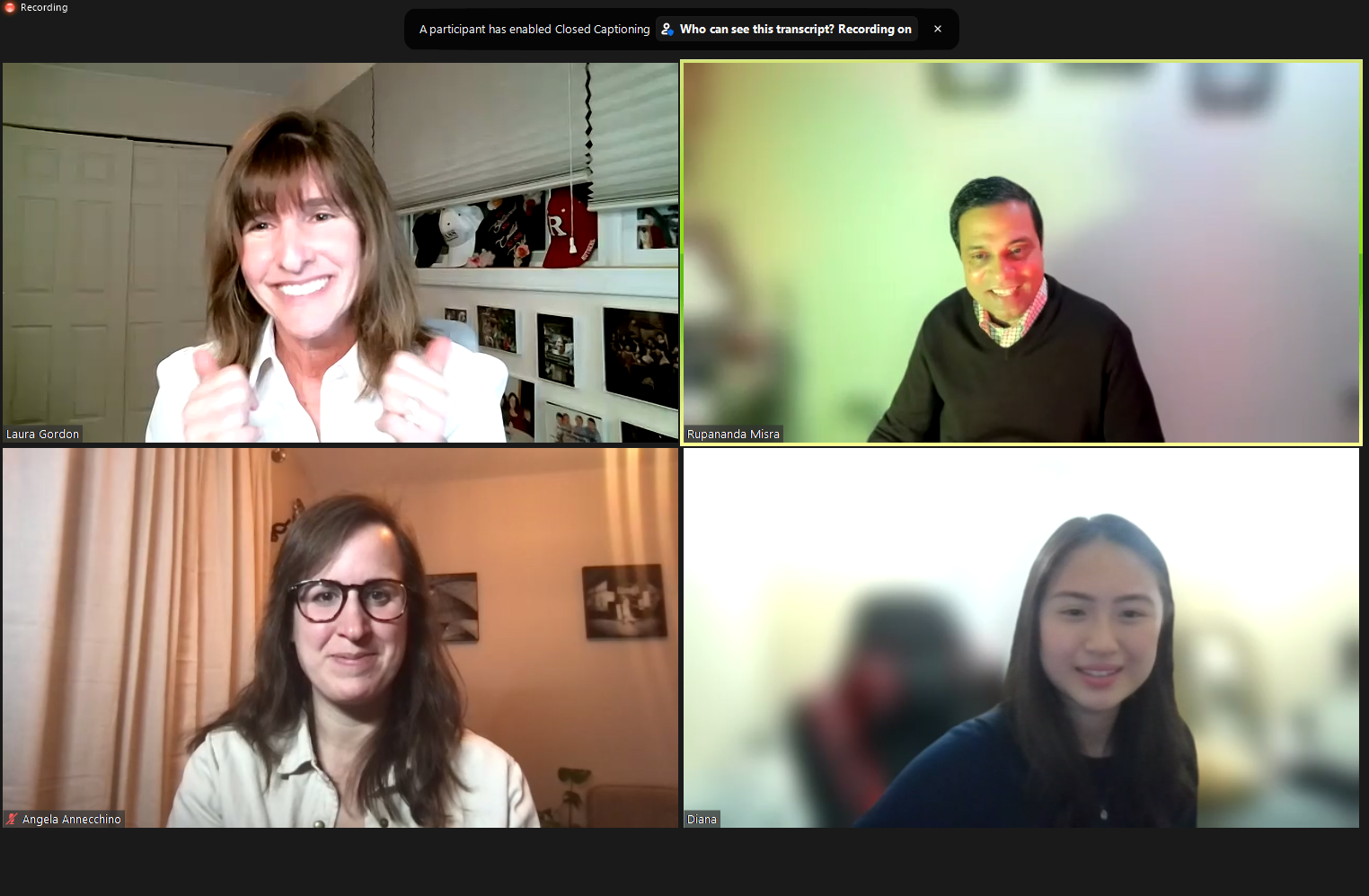At the Professional Science Master’s program, we provide our students with the tools to succeed in a modern workforce. On March 29th, Rupa Misra, Ed.D., hosted a panel to provide students with insight into a very special topic—the job search process. Three MBS alumni shared advice and expertise on the job search process with current students. The alumni, all graduates of our User Experience Design (UXD) concentration, shared UXD-specific advice along with tips that are invaluable to all MBS students.

Meet the panelists
- Laura Gordon - Web developer, Rutgers School of Arts and Sciences
Gordon has worked in the IT industry since 1993, and she has had a focus on websites since 2004. She also co-moderated the event Rutgers University Women in IT: Journey Through the Decades, which featured PSM executive director Dr. Deborah Silver as a panelist.
- Diana Fu - Experience Design Specialist, KPMG
Fu recently had 1 year work anniversary with KPMG—congratulations, Diana! She has previously given advice at our MBS Alumni Career Panel, and KPMG has shared her experiences in her alumni spotlight.
- Angela Annecchino - Design Educator: Graphic, Photography, Drafting
Annecchino has been a career educator for 12 years. She has a passion for good design, and MBS allowed her to begin a journey focused on UX.
Q&A
What does it take to be a product designer or UX designer?
Each panelist shared their journey to becoming a UX designer. Gordon taught herself how to build websites. She had an opportunity to build websites for public libraries, which gave her experience in Joomla that eventually prepared her for a job at Rutgers. She advised students to start anywhere they can.
Annecchino started off as an educator and moved towards UX due to her desire to collaborate. She was driven by curiosity—she enjoyed learning from others and creating designs with meaning and purpose.
Fu first learned about UXD during a marketing internship. What helped her the most were the connections she made—she gave a special shoutout to Abbe Rosenthal, MA, PCC, DYL Certified Coach, for introducing her to UX opportunities.
What skills are the most important in this industry?
Gordon and Annecchino agreed, the ability to create genuine connections is an important skill. Networking helped Gordon build her career—being an active member of the Joomla LinkedIn community allowed her to network with (and learn from!) others all over the world.
For Annecchino, listening and communicating well are essential skills. It is especially important for UX designers to listen to their clients, understand their pains and needs, and communicate this to other teams.
What specific tools or processes are important to the UXD and product design industry?
Fu named adaptability as a skill crucial to excelling as a UX designer. They must adapt to whatever content and materials that are provided for a project.
UX designers should also play into their strengths. While many UX designers have a background in graphic or visual design, Fu leveraged her background in marketing to build her niche in UX strategy.
What’s the job market like?
Fu admitted that the current job market is tough, but she has noticed that companies still have openings. She recommended that students reach out to others for guidance and opportunities.
Gordon recommended thoroughly reading job applications, and applying even if you don’t meet all the requirements.
Annecchino noted that UX is a vast field with different titles and roles. She recommended that students find the best fit for their abilities.
How do you think the job marketing will be affected by artificial intelligence (AI)?
While UX designers don’t need to be an expert in AI, said Annecchino, it’s important to understand its potential and connect with those who know more. It’s always important to stay on top of business trends and to know what’s going on in the current market, said Annecchino.
Gordon recommended using AI for prototyping purposes, such as using it to fill in placeholder text that would otherwise read “lorem Ipsum.”
Fu agreed that AI should be used as an enhancement for designs rather than a substitute. UX designers need to know the basic principles of UXD and final designs should originate from human and empathetic research, said Fu.
What advice do you have for current students?
Build relationships with clients, said Gordon. She included recommendation letters from clients in her first portfolio. She also advised students to be active on LinkedIn—employers will look at your posts. Join the MBS current student group or learn more about how to level up your LinkedIn profile. Find a niche that excites you, learn about it, and talk about it. Gordon herself writes blogs for Joomla magazine. Demonstrating expertise will help you, especially during interviews.
Fu recommended that students find a niche when building a portfolio and create a personal brand. She also suggested students stay organized when it comes to tracking job applications and to reach out to other professionals for coffee chats. She gave a tip: before going into interviews, don’t be afraid to look up your interviewer on LinkedIn.
Where should someone completely new to UX start?
All panelists reiterated the importance of building your portfolio, even if you’re starting from scratch. Building your portfolio will allow you to learn different software programs and tools as well as demonstrate your abilities.
Gordon highlighted MBS externships as an excellent way to get started. They allow you to get in contact with clients, learn how to work with a team, and generate content that can be included in a portfolio. She also recommended joining professional groups.
If you would like to hear more alumni advice, read a recap of our last Virtual Friday: MBS Alumni Career Panel. To find more workshops, speakers, and panels, visit our events page. Stay up to date by following us on Twitter and LinkedIn.